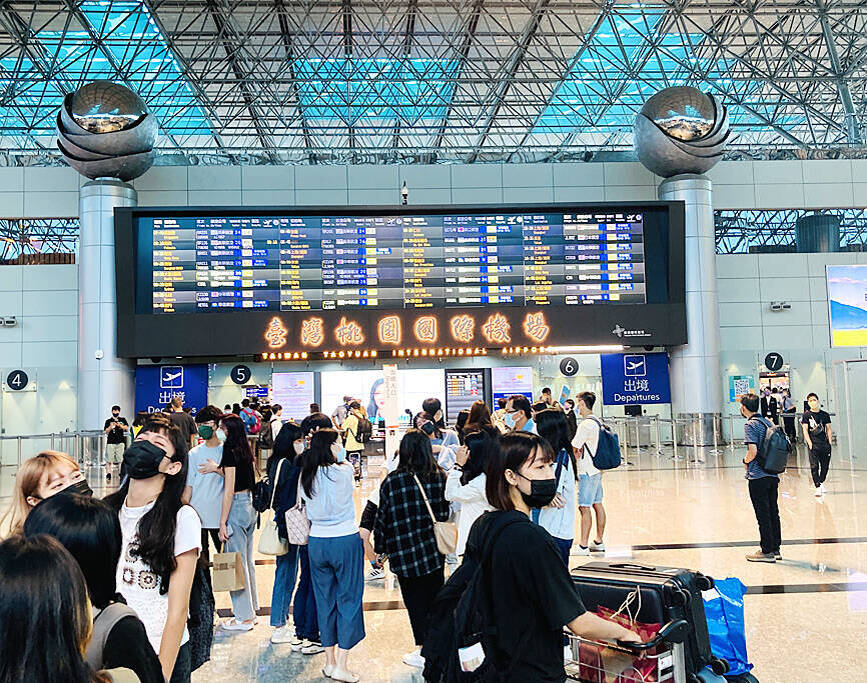Japan and the US have become the favored destinations for Taiwanese graduates as China’s attraction has waned over the years, the Ministry of Labor said.
According to the ministry’s latest income and employment advisory published this month, 3,215 Taiwanese university graduates from the class of 2020 went to Japan, surpassing for the first time the 2,881 graduates who went to China.
A total of 2,300 graduates from the class of 2021 went to the US, compared with the 2,262 who went to China, the document showed.

Photo: Chen Hsin-yu, Taipei Times
The trend continued for the class of 2023, of whom 1,460 went to Japan, 1,334 went to the US and 942 went to China, the data showed.
The United Arab Emirates (UAE) was for the past two years the fourth-most favored destination for Taiwanese graduates, topping South Korea, Australia and Singapore, the document showed.
The UAE’s early investment in artificial intelligence-related fields is the main reason behind the appeal of the Middle Eastern kingdom to Taiwanese pursuing studies abroad, a ministry official said on condition of anonymity.
The UAE has poured in investments in its pursuit to become a global tech leader and has been recruiting Taiwanese students via cooperative programs with local universities, the official said.
China’s main attraction to Taiwanese graduates was the employment opportunities offered by a growing economy and a common language, the official said.
In addition, young Taiwanese studying or starting businesses in China could receive various subsidies as part of Beijing’s Taiwan affairs policy to influence the nation’s politics, they said.
However, the lure of Chinese jobs has dimmed considerably as Taiwanese and international investors leave China amid the US-China trade dispute, the official said.
Beijing’s touted preferential treatment of Taiwanese seeking to work or start a businesses in China cannot compensate for these negative conditions, the official said.

US climber Alex Honnold is to attempt to scale Taipei 101 without a rope and harness in a live Netflix special on Jan. 24, the streaming platform announced on Wednesday. Accounting for the time difference, the two-hour broadcast of Honnold’s climb, called Skyscraper Live, is to air on Jan. 23 in the US, Netflix said in a statement. Honnold, 40, was the first person ever to free solo climb the 900m El Capitan rock formation in Yosemite National Park — a feat that was recorded and later made into the 2018 documentary film Free Solo. Netflix previewed Skyscraper Live in October, after videos

NUMBERS IMBALANCE: More than 4 million Taiwanese have visited China this year, while only about half a million Chinese have visited here Beijing has yet to respond to Taiwan’s requests for negotiation over matters related to the recovery of cross-strait tourism, the Tourism Administration said yesterday. Taiwan’s tourism authority issued the statement after Chinese-language daily the China Times reported yesterday that the government’s policy of banning group tours to China does not stop Taiwanese from visiting the country. As of October, more than 4.2 million had traveled to China this year, exceeding last year. Beijing estimated the number of Taiwanese tourists in China could reach 4.5 million this year. By contrast, only 500,000 Chinese tourists are expected in Taiwan, the report said. The report

Temperatures are forecast to drop steadily as a continental cold air mass moves across Taiwan, with some areas also likely to see heavy rainfall, the Central Weather Administration (CWA) said. From today through early tomorrow, a cold air mass would keep temperatures low across central and northern Taiwan, and the eastern half of Taiwan proper, with isolated brief showers forecast along Keelung’s north coast, Taipei and New Taipei City’s mountainous areas and eastern Taiwan, it said. Lows of 11°C to 15°C are forecast in central and northern Taiwan, Yilan County, and the outlying Kinmen and Lienchiang (Matsu) counties, and 14°C to 17°C

STEERING FAILURE: The first boat of its class is experiencing teething issues as it readies for acceptance by the navy, according to a recent story about rudder failure The Hai Kun (海鯤), the nation’s first locally built submarine, allegedly suffered a total failure of stern hydraulic systems during the second round of sea acceptance trials on June 26, and sailors were forced to manually operate the X-rudder to turn the submarine and return to port, news Web site Mirror Daily reported yesterday. The report said that tugboats following the Hai Kun assisted the submarine in avoiding collisions with other ships due to the X-rudder malfunctioning. At the time of the report, the submarine had completed its trials and was scheduled to begin diving and surfacing tests in shallow areas. The X-rudder,